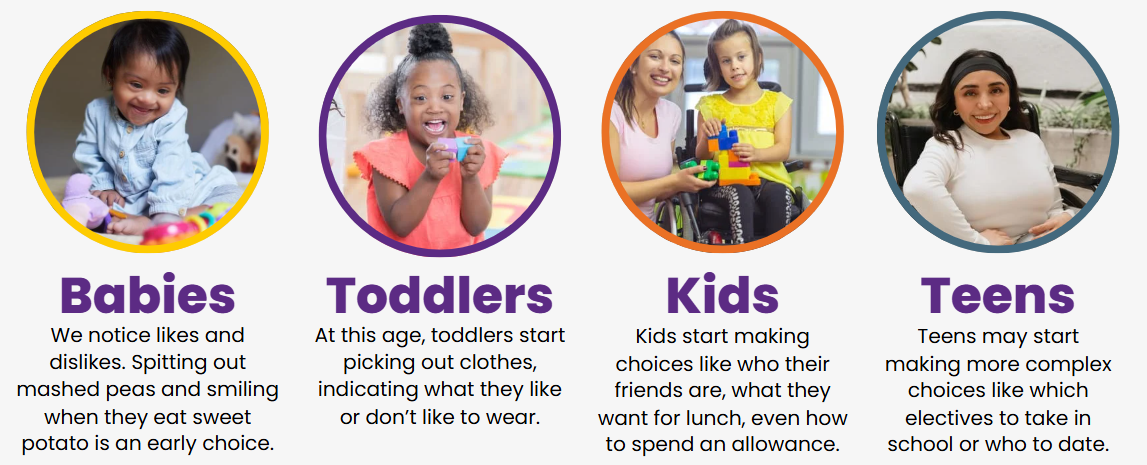Decision-Making Supports and Guardianship
Leaving the Door Open on Decision-Making
Making your own decisions is an exciting part of growing up, but we know families can get anxious about their loved ones with disabilities taking the lead. Families may ask questions like: "Can you (as someone with a disability) make safe choices as an adult?" and "What types of supports are available for decision-making?" and "Do I, as a family member, need guardianship to keep my loved safe?"
Virginia has a number of options to help loved ensure people with disabilities are supported and that people with disabilities can keep as many of their civil rights as possible. Some folks call these options the “Continuum of Decision-Making Supports.” This continuum is adapted above to show that Supported Decision-Making (SDM) leaves the door wide open for a person with a disability to make their own choice.

Supported Decision-Making
It is an agreement someone with a disability makes with a person (or people) they trust to help them make choices about health care, money, where to live, and more. You (the person with a disability) fill out a supported decision-making agreement as you get ready to turn 18 years old. The document is long and goes over every big part of your life, so take your time to work through it.
Advanced Directives
This is not a disability-specific alternative to guardianship, but can help get an important support system in place. An advanced directive is a legal document that allows you to express your wishes regarding medical care, which can be used if you are not able to communicate them later. The disAbility Law Center created a DIY Advanced Directives toolkit to help you get started!
Powers of Attorney (POA)
This is not a disability-specific alternative to guardianship, but can help get an important support system in place. POA give someone the power to make decisions on another’s behalf, but the person can only make decisions on specific topics. POA goes into effect when a person chooses, on an agreed date, or if an agreed upon event (like an accident) happens. POA can be reversed.
Representative Payee
This is a person or organization who helps people receiving social security benefits manage them. It is a program that goes through the Social Security Administration, and they always try to assign family or friends as a representative payee first. If they cannot find someone, they may assign an organization. Representative Payees only help people with benefits like Supplemental Security Income (SSI) and Social Security Disability Insurance (SSDI).
Conservatorship
In a conservatorship, the court appoints a person or organization manage the finances, real estate, and personal property of someone who the court determined as unable to manage these things themselves.
Supported Decision Making in Virginia: An Overview for People with DD and Their Families
On your left is a recorded training by the Virginia Department of Behavioral Health and Developmental Disabilities Services. This 43-minute training goes over the history of supported decision-making, related documents, and additional resources.
DBHDS has quarterly training events you can check out and register for here.
Decision-Making as a Skill
Many people think of decision-making as something we just naturally do, but it is also a skill we have to build over time. Preparing for transition to adulthood and identifying if you need help making choices should not wait until high school or later! You can start building decision-making skills and your support network at any age. Sometimes, we are working on those skills and do not know it. You can help build these skills by:
- Offering a child low-stakes options like "Do you want milk or apple juice with breakfast?" and communicating afterward about how they felt about their choices
- Celebrating the choices that turn out well
- Communicating about what happened and what they can do differently when choices do not turn out to be good ones
- Keeping a decision-making journal to see how your loved one/you as a person with a disability is growing as a choice-maker

"Dignity of Risk"
Dignity of Risk is a common concept among self advocacy groups, and it refers to the right to make choices that may or may not work out. It is very normal for people without disabilities to make mistakes, and many of those mistakes are important to someone's growth. In some ways, we try to keep people with disabilities from making mistakes and learning from them. This often comes from a place of and our natural instinct to keep the ones we love safe.
Giving people with disabilities the chances to take risks and make mistakes also means giving them the chance to succeed, build identities, fall in love, find their dream job, and see someone they voted for make positive changes in their community.
Working with our loved to build a strong support network of people we trust means having spaces where we can talk about risks and dream big!
Types of Guardianship
Temporary Guardianship
A temporary guardianship is when the court appoints a guardian for someone and specifies how long the guardian will last in the appointment. If your child with a disability is turning 18 soon, and you need time to explore your options but are anxious about decisions in the immediate future, you can arrange for temporary guardianship.
Limited Guardianship
Limited guardianship is when a court appoints a guardian to manage specific decisions, like healthcare or housing. In these situations, an adult with a disability can make their own choices in all aspects of their life except for what is outlined in the court appointment.
Full Guardianship
In this arrangement, an adult with a disability loses all their basic civil and decision-making opportunities, making it the most restrictive option. All final decisions are made by the guardian, even if the guardian involves the person in the decisions they are making. Full guardianship can be the right option for some people, but should be a last resort as it is complete and difficult to undo.
More Resources
